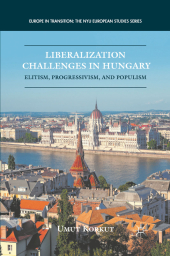 Neuerscheinungen 2015Stand: 2020-02-01 |
Schnellsuche
ISBN/Stichwort/Autor
|
Herderstraße 10
10625 Berlin
Tel.: 030 315 714 16
Fax 030 315 714 14
info@buchspektrum.de |

U. Korkut
Liberalization Challenges in Hungary
Elitism, Progressivism, and Populism
1st ed. 2012. 2015. x, 243 S. 229 mm
Verlag/Jahr: SPRINGER PALGRAVE MACMILLAN; PALGRAVE MACMILLAN US 2015
ISBN: 1-349-29609-0 (1349296090)
Neue ISBN: 978-1-349-29609-5 (9781349296095)
Preis und Lieferzeit: Bitte klicken
In Hungary, as in all of "new Europe," liberalization is troubled. Using Hungary as an in-depth case study, Korkut demonstrates that, in squandering popular goodwill, credibility, and favorable circumstances after 1989, liberal politicians have found themselves vulnerable to conservative populist politics and the global economic crisis.
Why Hungary? What Causes Liberalization Troubles? Historical Features of Liberal Thought and Liberalism in Hungary Liberalization after 1989 The Conservative Reaction
"For scholars, this book will prove to be a tremendous resource on Hungarian politics over the past twenty years probably the best book to date." - Slavic Review, Vol. 72, No. 4, Winter 2013
"Korkut´s careful case study of the challenges of liberalization in a transitioning democracy, in this case Hungary, illustrates exactly how and why detailed examination and attention to historical legacies and national specificity is absolutely necessary to the wider literature on democratization. His bleak and central contention - that democratization and liberalization do not necessarily cohere and may indeed undermine one another if they fail to generate mutually beneficial conditions for existence - will generate sober reflection on the part of political scientists, historians, and policymakers alike. For this reason, this is much more than a book about the Hungarian experience; it functions as an elegantly reasoned wake-up call to all concerned about how political liberalism has been democratically undermined in 21st century polities coping with economic crisis, rising inequality, ethnic tension, and nationalist populism, and how democracies in turn have been eroded by neoliberal prescriptions for economic growth and stability." - Barbara J. Falk, associate professor, Canadian Forces College
"Since 2010, politics in Hungary has lurched in an alarming and reactionary direction. Korkut (Glasgow Caledonian University, UK) analyzes the reasons for the failure of liberalism in what had formerly been the socialist bloc. Economic liberalization ran ahead of true political liberalization Neoliberalism provided a moral justification for the rule of a narrow elite of intellectuals turned politicians . . . The book includes chapters on the party programs after 1990, the history of liberal thought in Hungary, and the discursive strategies of liberal leaders and conservatives." Choice
Umut Korkut is a Reader in Politics at Glasgow Caledonian University, UK.


